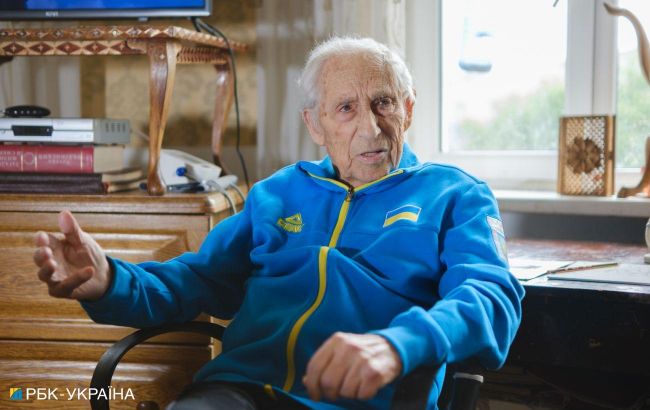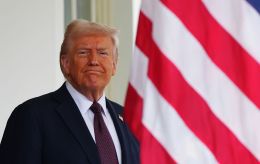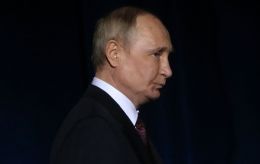'They call us fascists, yet they are 'Ruscists' - Witnesses of the World War II on two wars and price of victory
 Volodymyr Kostiantynov (Photo: Vitalii Nosach/RBC-Ukraine)
Volodymyr Kostiantynov (Photo: Vitalii Nosach/RBC-Ukraine)
Before the Day of Victory over nazism, which in Ukraine this year falls on May 9 for the last time, journalists from RBC-Ukraine met with participants of World War II and discussed the two largest wars of the past century and their thoughts on the Russian-Ukrainian war.
When Russia initiated the war against Ukraine, it made many draw parallels and turn to history. Today's confrontation is being referred to as the largest in Europe since World War II.
Several generations have grown up hearing stories of a cruel, long, and tragic war. Millions of people received a unique "vaccine" against various manifestations of racial and national superiority, making peace and security a priority for their countries.
The victorious countries have celebrated the Day of Victory over fascism and nazism every year, mourning the fallen and hoping for "never again." After the collapse of the USSR, the Kremlin declared itself the heir to the "country of Soviets," appropriating everything, including the victory over fascism.
Gradually, Russians, reminiscing about World War II (which they refer to as the Great Patriotic War), have shifted from wishes for "no more war" to threats of "we can repeat it." Young people, who only know war from movies, promised to reach Berlin on Victory Day. The day of mourning and remembrance turned into a celebration of victory.
On February 24, 2022, 77 years after the bloodiest and most brutal war in Europe, Russians finally decided to "repeat" it and launched missile strikes on dozens of Ukrainian cities, initiating a full-scale invasion. Justifying the attack, the Kremlin labels Ukrainians as fascists, using a trigger well-known to the Russian people.
Meanwhile, in Ukraine, there are still people who have experienced the horrors of World War II and know the price the Ukrainian nation paid to end true fascism and nazism in Europe.
From Kharkiv to Stalingrad
We are visiting Yuliia Druzhkova, who will turn 100 years old in the fall. She was born in October 1923 in the Kharkiv region and experienced the war as a young girl. Halyna Vyhovska is guiding us to her. She worked in social services for a long time and decided not to abandon her job after retiring.
"How would they be without me? For example, Yuliia Afinohenivna. She is wonderful, but no one takes care of her. She can hardly hear or see anything. How could I abandon her?"

Halyna Vyhovska (Photo: Vitalii Nosach/RBC-Ukraine)
Yuliia Afinohenivna lives in an old house with high arches in the Podil district. As we go up the wide stairs, Halyna Vyhovska mentions that the house was built by German prisoners of war. Now, a veteran lives there. The large wooden doors open before us, and a clear voice echoes in the hallway. Yuliia Afinohenivna welcomes us with a smile and immediately calls for Halyna, extending an empty hand.
"While I was waiting for you, I lost my walker," she says, laughing.
We enter the apartment, find the walker, bring the groceries to the kitchen, and introduce ourselves. When she hears our names, she sits on the bed and asks for our patronymics. "Well, Vitalii Volodymyrovych (referring to the photojournalist), please have a seat," she adds, pointing to a chair next to the bed. She prefers to have people close by; it makes talking easier, explains Galina. We ask about the first days of the war.
 Yuliia Druzhkova (Photo: Vitalii Nosach/RBC-Ukraine)
Yuliia Druzhkova (Photo: Vitalii Nosach/RBC-Ukraine)
"When the war started, we had just finished school and were planning to enter university. I enrolled in the Mechanical Engineering and Machine Building program, but I didn't even have a chance to attend a single day of classes. We were immediately sent to the trenches in Zmiiv, a city near Kharkiv. We dug ourselves into trenches."
In 1941, young Yuliia Druzhkova was not kept in Kharkiv for long. When the city started getting bombed, people decided to evacuate and were sent to Stalingrad (now Volgograd, a city in Russia) on ordinary freight trains. Reflecting on the situation in Kharkiv at that time, the woman adds that it is difficult for her to imagine it today. We pause and consider that perhaps it's for the better that Yuliia Afynohenivna doesn't fully comprehend the scale of the current war.
"We traveled to Stalingrad by freight train for a long time. Just as we unloaded from that train, suddenly there was an air raid with bombings. Fire and flames everywhere. We were terrified. We thought Stalingrad was safe. That's how it all began."
Yuliia Druzhkova's father served on the front lines, and her mother worked at a factory manufacturing ammunition. Yuliia herself was sent to accelerated nursing courses. During the day, they studied, and in the evening, they practiced.
"We didn't go outside for weeks, day or night. Imagine a four-story school (turned into a hospital), with bunk beds everywhere. Can you imagine how many people were there? There were 800 wounded. And you were the on-duty nurse, and the doctor was on duty. We had blackout curtains. There was a lamp on the doctor's table. It was dark all around, and we were like kittens. And at night, we would hear cries: 'Nurse! Doctor!' We would rush to them."
At that time, Stalingrad was engulfed in flames. While a battle raged on the unstable front line, resembling a meat grinder, the city was mercilessly bombed. The woman, covering her ears and widening her eyes, recalls the whizzing bullets and the sound they left behind. Not a single day passed without the Nazis dropping bombs, destroying buildings, and taking lives. After each air raid, young nurses and doctors would walk through the rubble and personally evacuate the wounded.
"Many people died during the bombings. We would carry them on stretchers. And there was a soldier lying there, and he would ask, 'Who are you? Who are you going to take me? Girls like you should be giving birth, not carrying stretchers! I won't lie on any stretcher!' But he couldn't walk; he had a thigh injury. How do you carry him? You have to transport him somehow. That was our service."
As Yuliia Afinohenivna talks about the war, she occasionally seeks the listener's hand. It is important for her to feel that she is being heard. When discussing her role, she emphasizes that she was just a child and didn't understand anything - she lived without long-term plans, not knowing when the war would end. 'We knew a terrible war was happening. But what would happen to us, what we would do next - we didn't know.' It's another striking parallel we draw for ourselves.

Yuliia Druzhkova (Photo: Vitalii Nosach/RBC-Ukraine)
They were taken to Kyiv, Yulia Druzhkova, her family, and her colleagues, after the liberation of the capital from the Nazis in November 1943. The war was still raging, but the liberation of Kyiv gave hope and boosted morale. Initially, they had planned to transport the group of nurses along the shifting front lines, but later a decision was made to keep them in Kyiv. Yuliia Druzhkova doesn't remember much about Victory Day, but she vividly describes the emotions she felt - joy and relief that there was no longer a need to fear and that they could finally live.
The second half of the 20th century was quite eventful for the woman. Yuliia Druzhkova had her fair share of experiences. She had the opportunity to work under the guidance of Mykola Strazhesko, whose name bears the Cardiology Institute in Kyiv. Another notable memory for her was meeting academician Borys Paton.
"I came to work at the school that is now Kyiv-Mohyla Academy, to the special operations department, and my boss went on vacation. I stayed, and since the department was large, I became the head. I was introduced to Paton, and the department revolved around him, making Borys Paton my only superior."
Throughout her life, Yuliia Druzhkova held high-ranking positions within the party, including those involving various "secret missions," as she calls them. She is not well-informed about the current war, showing signs of age and limited contact with the outside world. There is no television or computer in her house. When asked about her stance on the Russian invasion of Ukraine, Yuliia initially seemed unaware. However, later on, she smiled and quoted lines from Alexander Griboyedov's comedy "Woe from Wit."
"Do you remember Chatsky's monologue? The 'Frenchman from Bordeaux' talked about his journey to Russia, to the 'barbarians' with fear and tears. It was years ago, and they were already called barbarians..."
Before leaving, we thank Yuliia for the conversation, but she shrugs and says she hasn't been much help. "Nurses didn't even receive any awards, and I'm not a front-line soldier," says Yuliia, leaning on her walker.
Hunger, war, and photography
We also visit veteran Volodymyr Kostiantynov, who resides in the Podil district. Halyna Vyhovska, who accompanies us, shares her own past along the way. She was born in 1948, and her father served on the front until the street battles in Berlin. He primarily taught his children history.
"Why do I live through all this? Why can't I let go? My father went through all of it, and he himself was a historian. His grandfather collected a vast library and taught children history. My father knew that history changes. I want to preserve it."
There are not many veterans left, as many have passed away due to COVID-19. In just a few years, the witnesses of World War II in Kyiv have dwindled from thousands to a mere hundred. Soon, World War II will become a distant memory with no living witnesses.
Volodymyr Kostiantyniv lives in a similar building with wide stairs and high ceilings. At the door, we are greeted by a smiling man in the uniform of the Ukrainian Olympic team. Volodymyr Opanasovych has dedicated his entire life to physical education. His age of 94 does not hinder him.

Black-and-white photographs hang on the walls of his apartment, and we immediately recognize a young Volodymyr Opanasovych in one of them. "Yes, that's me," he proudly states, straightening his posture.
His room resembles a workshop, with wooden statuettes of men and women on the shelves, and paintings on the walls. There are depictions of a rural house with a thatched roof, a church by the riverbank, and children. The scenes are abundant and heartwarming, like reading a collection of Ukrainian poetry in school. We sit down, and a large gray cat named Dymka jumps onto the retiree's lap.
"I was born in the village of Vytachiv, a historic village in the Obukhiv district of Kyiv region. It was the year 1928 when the Holodomor began. People started dying in the village. All my relatives on my mother's side died of starvation."
The man speaks easily, gesturing fluently as if painting a picture. The war caught 13-year-old Volodymyr Opanasovych on Trukhaniv Island, where they were living at the time.
"We were swimming in the Dnipro River with the boys that morning. Suddenly, we saw an aerial battle - it was a Messerschmitt and our sluggish fighter. There was a fight, and we were swimming while fragments fell into the water."
Kyiv began to be bombed, and the local authorities evacuated people from Trukhaniv Island. The man's family settled in Podil, opposite the funicular. He witnessed the Nazis with his own eyes.
"There were hundreds of stores on Sahaidachny Street at the time. At the beginning of the war, people started raiding them. I loved to draw, and there were watercolor paints in the stationery store. I ran to Kontraktova Square, where there was a line for bread, and the Germans threw a bomb at them. Everyone perished."
The occupation of Kyiv by the Germans can be compared to what the occupied Ukrainian territories are experiencing today. The Nazis drove around the city in vehicles with swastikas, the stores worked poorly or closed altogether. Cafes and restaurants were only open to Germans, and they were served in hospitals. The city had its own kind of concentration camp.

We hear similar stories today about Mariupol, Melitopol, Donetsk, and Luhansk. The Russians are hardly distinguishable from those they once fought against. By calling Ukrainians fascists, the occupiers precisely follow the methods of the Third Reich, not forgetting to add a touch of Russian imperialist grandeur.
"My father ended up in captivity. There was a concentration camp on one of the streets. My mother received a note, they called her Paraska: 'Pasha, bring some food.' We arrived, and there was such a wasteland, a fence, dead people near the fence, wire fences, and prisoners. A German was sitting with a tank machine gun at the corner, and someone behind the fence was shooting. And suddenly, we saw my dad. I saw him and crawled, and the German pointed the machine gun at me. All the prisoners who were there rushed at the German and covered him. I handed my dad the basket."
While keeping the city under occupation, the Germans tried to convince the population that they were liberating it. They hung posters with Hitler all over Kyiv and labeled them as "Hitler, the liberator!" Against this backdrop, the hanged bodies looked particularly cynical.
We asked how Ukrainians felt about the Germans at that time. Volodymyr Opanasovych wrinkles his forehead, then says that there were also normal humans among them.
"My father once encountered a German while walking home. He saw him with a gun on his shoulder. He remembered the word 'kinder' (child in German) and shouted, 'I have a kinder!' The German took out his wallet and said, 'I have children too.' And he escorted him right to the doorstep, that German.'
As he describes this episode, the man starts to cry. We comfort him and ask about the parallels. He nods understandingly.
"This is a criminal attack, it's madness. It's a crime, in my opinion. It shouldn't happen. They call us fascists, yet they are Ruscists. What our people show is success, it's victory. Russia is deprived of everything, Putin is disgraced, and everyone has turned away from him. We have Ukrainian identity, we are a strong state."

We are discussing the Russian rhetoric, who have privatized the victory in World War II and are now bombing cities where those who forged that victory reside. Volodymyr Opanasovych notes that the majority of the war's hardships fell upon Ukrainians. Occupation, bombardment, millions of casualties, and hundreds of Ukrainian battalions.
"What kind of liberation? This is madness? I dream of victory. My father always made the first toast: 'To prevent war.' And they want to 'repeat' it. What is there to repeat?"
We thank Volodymyr Opanasovych, reminding him to sort out the groceries left in the kitchen. He smiles and says he will share them with his neighbor - that's how they do it.
It has been just a century since the world has been engulfed in another great war. Cities are being bombed and occupied again, and lives are being taken once more. Having become one of the victorious nations, Russia has decided that it has the right to dictate terms and global order, divide territories, and rewrite history. Like 80 years ago, Ukrainians are fighting against the enemy. Like hundreds of years ago, the enemy remains the same. We can only hope that this will be the final battle and the Russians will never be able to repeat it.

